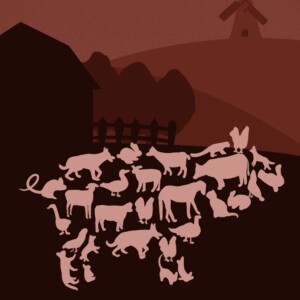
Friday Dec 08, 2023
Witnessing the Dystopian Warning: George Orwell’s Unsettling Literary Legacy
What are the moral lessons in Animal Farm?
- Power corrupts: One of the central themes of the novel is the corrupting nature of power. As the pigs gain control over the farm and establish their own hierarchy, they gradually abuse their power, becoming indistinguishable from the humans they initially rebelled against.
- Equality and justice are fragile: Animal Farm explores the idea that ideals such as equality and justice are easily undermined and eroded by selfishness and the desire for power. The pigs' gradual erosion of the original commandments and their alteration of the farm's governance reflects this moral lesson.
- Ignorance breeds manipulation: The animals on the farm are easily manipulated due to their lack of knowledge and education. This highlights the importance of critical thinking, education, and being informed to prevent falling victim to propaganda and manipulation.
- Unity and collective action are necessary for change: The initial rebellion on Animal Farm occurs through the unity and common goal of the animals. However, as the pigs take over, the animals become divided, leading to their downfall. The novel underscores the significance of unity and collective action to resist tyranny and maintain a just society.
- Language can be manipulated to control and deceive: Animal Farm explores how language can be manipulated to distort reality and deceive others. The pigs use propaganda and rhetoric to justify their actions and maintain control over the other animals. This demonstrates the importance of being aware of the manipulation of language and critically analyzing the messages conveyed.
Overall, Animal Farm serves as a cautionary tale, reminding readers of the dangers of authoritarianism, the abuse of power, and the importance of remaining vigilant to protect democratic values and individual freedoms.
Why is Animal Farm book worth reading?
Firstly, it is a classic work of literature that has stood the test of time. It was written by George Orwell in 1945 but its themes and messages are still relevant and applicable today. The book explores important themes such as power, corruption, and the dangers of totalitarianism. By using allegorical characters, Orwell vividly depicts the ugly realities of authoritarian regimes and the potential for oppression and injustice.
Secondly, Animal Farm is a thought-provoking and satirical novel. It presents a fictional story about a group of animals who overthrow their human farmer to establish a new society based on equality and freedom. However, as the story unfolds, the animals' noble intentions are gradually corrupted, and power ends up in the hands of a few, mirroring the reality of many revolutions in history. The book's clever and witty narrative prompts readers to reflect on political systems, leadership, and the manipulative tactics used to maintain control.
Moreover, Animal Farm serves as a critique of human nature. It examines the flaws and weaknesses inherent in individuals and societies that make them susceptible to manipulation and oppression. By personifying animals and their characteristics, Orwell shows how power can corrupt even the noblest of intentions. This exploration of human nature invites readers to consider their own roles and responsibilities in shaping society and to question the structures and systems that govern them.
Finally, Animal Farm is a relatively short and accessible read, making it suitable for a wide range of readers. It is a book that can be enjoyed by both young adults and adults, and its clear and concise writing style makes it easy to follow and understand.
Overall, Animal Farm is worth reading because it offers valuable insights into politics, power dynamics, human nature, and the importance of vigilance in defending freedom and equality. It is a captivating and thought-provoking book that continues to resonate with readers around the world.
How does Animal Farm relate to real life today?
Animal Farm is a novel by George Orwell that uses animals to portray the political events and uprisings that took place during the Russian Revolution and leading up to the Soviet Union. The story serves as a cautionary tale about the corrupting nature of power and the dangers of totalitarianism. Despite being set in a specific historical context, Animal Farm holds relevance to real-life situations today in several ways:
- Corruption and abuse of power: Animal Farm highlights how those in power often manipulate their positions for personal gain, leading to corruption and the erosion of freedoms. This theme remains relevant today as corrupt leaders, politicians, or corporations exploit their authority and exploit the system for personal benefits.
- Propaganda and manipulation: The novel emphasizes the role of propaganda and misinformation in manipulating public opinion. This is still relevant today, with the spread of fake news and misinformation through social media platforms, leading to widespread confusion and manipulation of people's beliefs.
- Inequality and exploitation: Animal Farm explores the theme of inequality and exploitation as the ruling class takes advantage of the working class. This mirrors real-life scenarios where socioeconomic disparities persist, with the wealthy and powerful exploiting or neglecting the needs of the less affluent.
- Loss of individual freedoms: The novel depicts how the animals lose their basic rights and freedoms as the pigs consolidate power. This relates to real-life situations where authoritarian regimes or dictatorships suppress dissent, control the media, and curtail individual liberties.
- Historical parallels: Although Animal Farm is based on the Russian Revolution, it serves as a broader critique of oppressive regimes throughout history. It can remind us of the dangers of totalitarianism, whether it be in historical contexts like Nazi Germany or contemporary situations where democratic institutions are threatened.
In summary, Animal Farm's themes of corruption, propaganda, inequality, loss of freedoms, and historical parallels make it relevant to real-life situations today, serving as a warning against the abuses of power and the erosion of democratic values.
No comments yet. Be the first to say something!